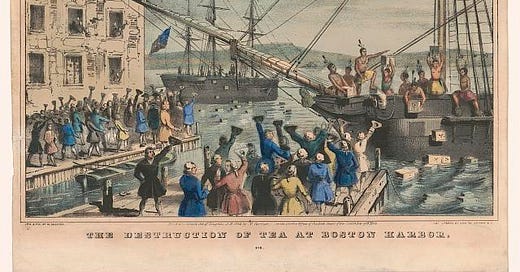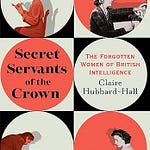About one hundred men dressed in disguise as Mohawk Native Americans bore the pain of icy winds that whipped across Boston's harbor on the cold winter night of December 16, 1773, as they climbed aboard three ships carrying tea from Britain to the colonies. Once aboard, the men began dumping tea boxes into the water. It was an act of defiance with a potentially steep price: their lives. Treason charges and the hangman's noose would likely be their punishment if caught.
The actions of these men became known as the Boston Tea Party, and it brought the American Colonies a step closer to war with the British.
The buildup to that night had begun many years prior. While it often isn't easy to define exact starting points in history, many argue that the heightened tensions between the American colonies and the British Government started soon after the French and Indian War ended in 1763. In that war, the British accrued significant debt from their participation and sought ways to replenish their treasury. They decided to pass taxes on the American colonies, asserting a right to collect revenue without the colonist's consent. Among these was the Stamp Act of 1765, which imposed a direct tax on various printed materials.
The colonists reacted with outrage, claiming "No taxation without representation," as they had no elected representatives in the British Parliament to voice their interests. The dissent had enough momentum to repeal the Stamp Act in 1766. But colonial trust in the British government had been damaged.
More discontent came shortly after with the Townshend Acts of 1767. These placed duties on essential imports like glass, paper, and tea. Colonists organized boycotts in response, leading to simmering tensions and clashes between British soldiers and colonists. In one instance, British troops fired into a crowd, killing five in what became known as the Boston Massacre of 1770. Animosity towards the British government deepened.
Despite the growing unrest, the British Parliament continued to further control colonial trade and taxation, leading to the Tea Act of 1773. The law was passed for several reasons. One, it helped the struggling British East India Company by allowing it to sell its surplus tea directly to the American colonies at a reduced price. And two, it aimed to undercut the price of smuggled Dutch tea, which had become popular in the colonies because it was untaxed and, therefore, cheaper. By making British tea more affordable than the smuggled Dutch tea, Parliament hoped to curb the illegal trade and reinforce the existing tax collection, asserting its right to tax the colonies.
Although the Tea Act did lower the price of tea, many colonists were furious. They saw it as a tactic to make them accept "taxation without representation" along with a reduction in fair competition. Resistance movements sprang into action to oppose the landing of taxed tea in American ports.
The rallying cry for men participating in the Boston Tea Party became, "Let every man do his duty, and be true to his country."
On the night of December 16, they gathered to begin the protest, which would take about three hours and meet no resistance from British troops.
Outraged, the British government responded with the Coercive Acts (known in the colonies as the Intolerable Acts) in 1774. These measures aimed to punish Massachusetts by closing Boston's port and altering the colony's governance. But far from subduing the rebellion, these actions galvanized other colonies to unify in support of Massachusetts, setting the stage for the First Continental Congress and, ultimately, the American Revolution.
The Boston Tea Party had become a symbol of defiance and a spark that helped ignite a path to independence.
Sources:
"Boston Tea Party." University of Houston Digital History, https://www.digitalhistory.uh.edu/disp_textbook.cfm?smtID=3&psid=1192
N. Currier. Destruction of tea at Boston Harbor. [New York: N. Currier] Photograph. Retrieved from the Library of Congress, <www.loc.gov/item/91795889/>.
Walker, Ida. The Boston Tea Party. United States, ABDO Pub., 2008.













Share this post